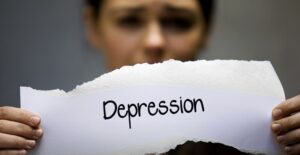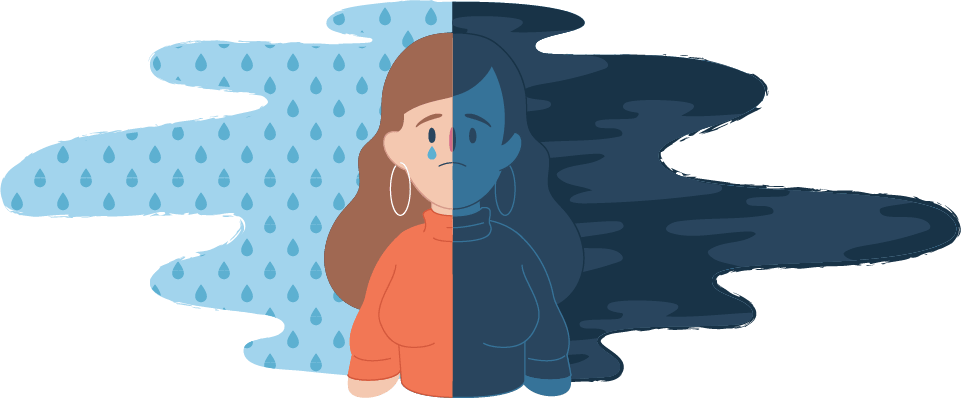Do you feel irritable and short-tempered a lot of the time? Do you find it hard to concentrate, or have trouble sleeping? If so, you may be suffering from depression. Depression is a serious mental illness that affects millions of people all over the world. While there are many different ways to treat depression, one of the most important things you can do is identify the root cause of your symptoms. In this blog post, we will discuss the link between irritability and depression – and what you can do about it!
Contents
What Is Depression?

Depression is a debilitating mental health condition that causes a person to feel hopeless, helpless, and worthless. People with depression often have negative thoughts about themselves and the world around them. They may also lose interest in activities that they used to enjoy and withdraw from friends and family. Depression can make it difficult for people to function at work or school and can lead to suicide.
Depression is also characterized by physical symptoms, such as fatigue, weight loss or gain, insomnia, and headaches. These symptoms can be so severe that they interfere with a person’s ability to work or take care of their basic needs.
What Is Irritability?
Irritability is a feeling of frustration, annoyance, or impatience. It is also a symptom of many mental health conditions, including depression. Irritable people may have difficulty controlling their emotions and may lash out at others. They may also become easily frustrated or annoyed by things that wouldn’t normally bother them. Irritability is different from anger. Anger is a normal emotion that everyone experiences from time to time. It becomes a problem when it is out of proportion to the situation or when it is difficult to control.
Irritability is a common symptom of depression. It can be one of the first signs that a person is experiencing depression. Irritability is often one of the main reasons why people seek treatment for depression. Irritability can make it difficult for people to maintain relationships, perform at work or school, and take care of their basic needs.
What Is The Link Between Irritability and Depression?

There is a strong link between irritability and depression. People who are depressed are more likely to be irritable than people who are not depressed. Depression can cause irritability, and irritability can be a symptom of depression. The two conditions often occur together.
The relationship between irritability and depression is complex. Depression can cause irritability, and irritability can be a symptom of depression. The two conditions often occur together.
There are many possible explanations for the link between irritability and depression. Depression may lead to irritability by causing changes in brain chemistry. Irritability may also be a symptom of depression, caused by the same changes in brain chemistry. The two conditions may also share common risk factors, such as genetics or stressful life events.
Treating irritability may not be the same as treating depression. If you are struggling with irritability, it is important to talk to a mental health professional. They can help you understand your symptoms and develop a treatment plan that is right for you.
Common Impacts of Irritability and Depression
How does being irritable or depressed impact a person’s day-to-day life?
Being irritable or depressed can have several impacts on a person’s day-to-day life. Some of these impacts may include:
Feeling Tired Or Run Down All The Time
One of the main impacts of being irritable or depressed is feeling tired or run down all the time. This can make it difficult to get out of bed in the morning, participate in activities that you enjoy, and be productive at work or school.
Loss Of Appetite Or Increased Appetite
Another common impact of being irritable or depressed is a loss of appetite or an increased appetite. This can lead to weight loss or gain, depending on which way your appetite goes. Sometimes, people who are irritable or depressed may turn to food as a way to cope with their feelings, which can lead to weight gain.
Trouble Sleeping
Another impact of being irritable or depressed is trouble sleeping. This can manifest itself in several ways, such as insomnia, waking up frequently during the night, or feeling exhausted during the day. This can make it difficult to function properly during the day and can lead to even more fatigue.
Difficulty Concentrating
When you’re irritable or depressed, it can be difficult to concentrate on anything. This can make it hard to complete tasks at work or school, follow conversations, and remember important information. Also, because depression can cause fatigue, it can be difficult to focus or pay attention when you’re feeling tired all the time.
Isolation From Friends And Family
An impact of being irritable or depressed that is sometimes overlooked is isolation from friends and family. When you’re feeling down, it can be hard to reach out to others and maintain relationships. As a result, you may find yourself withdrawing from those you love, which can lead to further feelings of loneliness and isolation.
Constant irritability or depression can have a major impact on your day-to-day life. If you’re struggling to cope with your symptoms, it’s important to reach out for help from a mental health professional. With treatment, you can learn how to manage your symptoms and start feeling better.
Coping-Up With Irritability and Depression

Cognitive behavioral therapy is an effective form of treatment for depression. It can help you identify and change negative thinking patterns that contribute to your depression.
If you’re struggling to cope with your symptoms, it’s important to reach out for help from a mental health professional. With treatment, you can learn how to manage your symptoms and start feeling better.
Some of these coping strategies for irritability and depression are:
1. Exercise
One of the main coping strategies for irritability and depression is exercise. Exercise is an effective treatment for depression, and it can also help to reduce feelings of irritability. Some of the exercises that you can use to cope with your symptoms include:
- Taking a brisk walk
- Going for a run
- Taking a yoga class
- Going for a swim
2. Mindfulness Meditation
Mindfulness meditation is another effective coping strategy for irritability and depression. This type of meditation involves focusing on the present moment and accepting your thoughts and feelings without judgment. Studies have shown that mindfulness meditation can be an effective treatment for depression, and it can also help to reduce feelings of irritability. Some of the mindfulness meditation exercises that you can use to cope with your symptoms include:
- Sitting quietly and focusing on your breath
- Focusing on the sensations in your body
- Observing your thoughts without judgment
3. Journaling
Journaling is another coping strategy that can be effective for irritability and depression. This involves writing down your thoughts and feelings in a journal or notebook. Writing about your experiences can help you to process them and make sense of them. It can also help to identify negative thinking patterns that contribute to your depression.
4. Relaxation Techniques
Relaxation techniques are another type of coping strategy that can be helpful for irritability and depression. These techniques can help to reduce stress and anxiety, which can lead to feelings of irritability. Some of the relaxation techniques that you can use to cope with your symptoms include:
Progressive muscle relaxation
Deep breathing exercises
Visualization
5. Connect With Others
Another coping strategy for irritability and depression is to connect with others. This can involve reaching out to family and friends, joining a support group, or attending counseling sessions. Connecting with others can help you to feel less alone and isolated. It can also help you to find new ways of coping with your symptoms.
6. Seek Professional Help
If you’re struggling to cope with your symptoms, it’s important to seek professional help. A mental health professional can provide you with the treatment and support that you need to manage your symptoms. Treatment for irritability and depression may include:
Cognitive behavioral therapy: CBT is an effective form of treatment for depression. It can help you identify and change negative thinking patterns that contribute to your depression.
Medication: Medication can be an effective treatment for depression. Antidepressants can help to improve your mood and reduce symptoms of irritability.
Electroconvulsive therapy: ECT is a type of treatment that is used for severe cases of depression. It involves passing electrical currents through the brain to trigger a seizure. ECT can be an effective treatment for depression, and it can also help to reduce symptoms of irritability.
7. Get Enough Sleep
Another important coping strategy for irritability and depression is to get enough sleep. Sleep deprivation can worsen symptoms of depression and irritability. It’s important to get 7-8 hours of sleep each night. You can also try taking a nap during the day if you’re feeling particularly fatigued.
8. Eat a Healthy Diet
Eating a healthy diet is another important coping strategy for irritability and depression. Eating nutritious foods can help to improve your mood and reduce symptoms of depression. Some of the best foods to eat include:
- Fresh fruits and vegetables
- Whole grains
- Lean protein
- Nuts and seeds
9. Avoid Alcohol and Drugs
It’s also important to avoid alcohol and drugs when you’re struggling with depression or irritability. Alcohol and drugs can worsen symptoms of depression, and they can also lead to addiction. If
you’re struggling with alcohol or drug abuse, it’s important to seek professional help.
Conclusion
Irritability and depression are two very common mental health conditions that can often occur together. While they share some common symptoms, they are quite different. Irritability is characterized by a feeling of frustration or anger, while depression is characterized by a persistent low mood. Treatment for these conditions often involves therapy and medication. If you think you may be experiencing either of these conditions, it’s important to talk to a mental health professional.
Also, treatments that work for one person may not work for another, so it’s important to find a treatment plan that’s right for you. If you’re struggling with irritability or depression, don’t hesitate to reach out for help.
Hope this article was of help to you! If you are suffering from mental health disorders, you may seek help from Therapy Mantra. We have a team of highly trained and experienced therapists who can provide you with the tools and skills necessary for overcoming mental health disorders. Contact us today to schedule an online therapy or download our free Android or iOS app for more information.


